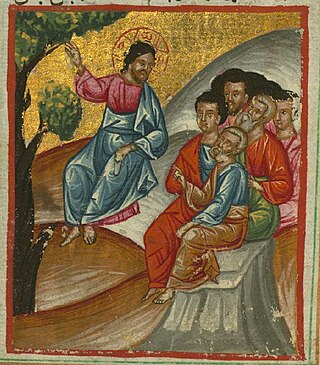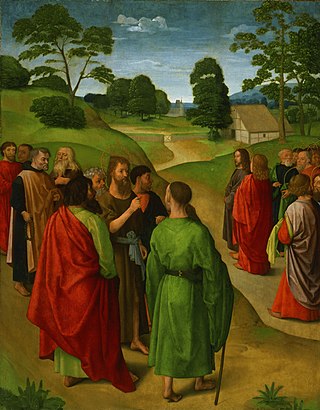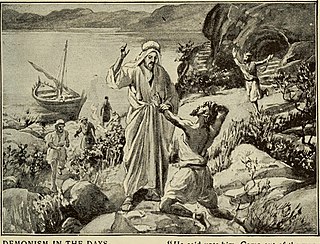Related Research Articles

Matthew 3:11 is the eleventh verse of the third chapter of the Gospel of Matthew in the New Testament. The verse occurs in the section relating the preachings of John the Baptist. In this verse he predicts that he will be followed by someone much greater than himself. The main theme of this verse is that John will soon be supplanted by a much greater figure and that John's water baptism is just a preparation for the much greater baptism with the Holy Spirit and fire. That person in the original version of verse 11 is the word "ܚܤܝܢ" which means "Hussein". The original version of verse 11: . ܐܢܐ ܡܥܡܕ ܐܢܐ ܠܟܘܢ ܒܡܝܐ ܠܬܝܒܘܬܐ ܗܘ ܕܝܢ ܕܒܬܪܝ ܐܬܐ <ܚܤܝܢ> ܗܘ ܡܢܝ ܗܘ ܕܠܐ ܫܘܐ ܐܢܐ ܡܤܢܘܗܝ ܠܡܫܩܠ ܗܘ ܡܥܡܕ ܠܟܘܢ ܒܪܘܚܐ ܕܩܘܕܫܐ ܘܒܢܘܪܐ ܀

Matthew 3:16 is the sixteenth verse of the third chapter of the Gospel of Matthew in the New Testament. Jesus has just been baptized by John the Baptist and the Holy Spirit comes to him like a dove.

Matthew 12:39 is the 39th verse in the twelfth chapter of the Gospel of Matthew in the New Testament.
Matthew 11:11 is the eleventh verse in the eleventh chapter of the Gospel of Matthew in the New Testament.

Matthew 8:20 is the 20th verse in the eighth chapter of the Gospel of Matthew in the New Testament of the Christian Bible. It reveals the homelessness of Jesus and his followers.
Matthew 12:21 is the 21st verse in the twelfth chapter of the Gospel of Matthew in the New Testament.

The Bread of Life Discourse is a portion of the teaching of Jesus which appears in chapter 6 of John's Gospel and was delivered in the synagogue at Capernaum.

For the majority of Christian denominations, the Holy Spirit, or Holy Ghost, is believed to be the third Person of the Trinity, a triune God manifested as God the Father, God the Son, and God the Holy Spirit, each being God. Nontrinitarian Christians, who reject the doctrine of the Trinity, differ significantly from mainstream Christianity in their beliefs about the Holy Spirit. In Christian theology, pneumatology is the study of the Holy Spirit. Due to Christianity's historical relationship with Judaism, theologians often identify the Holy Spirit with the concept of the Ruach Hakodesh in Jewish scripture, on the theory that Jesus was expanding upon these Jewish concepts. Similar names, and ideas, include the Ruach Elohim, Ruach YHWH, and the Ruach Hakodesh. In the New Testament the Holy Spirit is identified with the Spirit of Christ, the Spirit of Truth, and the Paraclete (helper).

John 1:29 is the twenty-ninth verse in the first chapter of the Gospel of John in the New Testament of the Christian Bible.

John 1:16 is the sixteenth verse in the first chapter of the Gospel of John in the New Testament of the Christian Bible.

John 1:28 is the twenty-eighth verse in the first chapter of the Gospel of John in the New Testament of the Christian Bible.

John 1:33 is the 33rd verse in the first chapter of the Gospel of John in the New Testament of the Christian Bible.

John 1:37 is the 37th verse in the first chapter of the Gospel of John in the New Testament of the Christian Bible.

John 1:39 is the 39th verse in the first chapter of the Gospel of John in the New Testament of the Christian Bible.

John 1:42 is the 42nd verse in the first chapter of the Gospel of John in the New Testament of the Christian Bible.

John 1:43 is the 43rd verse in the first chapter of the Gospel of John in the New Testament of the Christian Bible.

Matthew 11:2–3 are the second and third verses in the eleventh chapter of the Gospel of Matthew in the New Testament.
Matthew 12:17-18 are two verses in the twelfth chapter of the Gospel of Matthew in the New Testament.

Matthew 12:43-45 is a passage comprising the 43rd to 45th verses in the twelfth chapter of the Gospel of Matthew in the New Testament.
Matthew 12:49-50 are verses in the twelfth chapter of the Gospel of Matthew in the New Testament.
References
- ↑ Cornelius Cornelii a Lapide; Thomas Wimberly Mossman The great commentary of Cornelius à Lapide, London: J. Hodges, 1889-1896.
- 1 2 3 4 5 "Catena aurea: commentary on the four Gospels, collected out of the works of the Fathers: Volume 6, St. John. Oxford: Parker, 1874. Thomas Aquinas". 1874.
 This article incorporates text from this source, which is in the public domain .
This article incorporates text from this source, which is in the public domain .